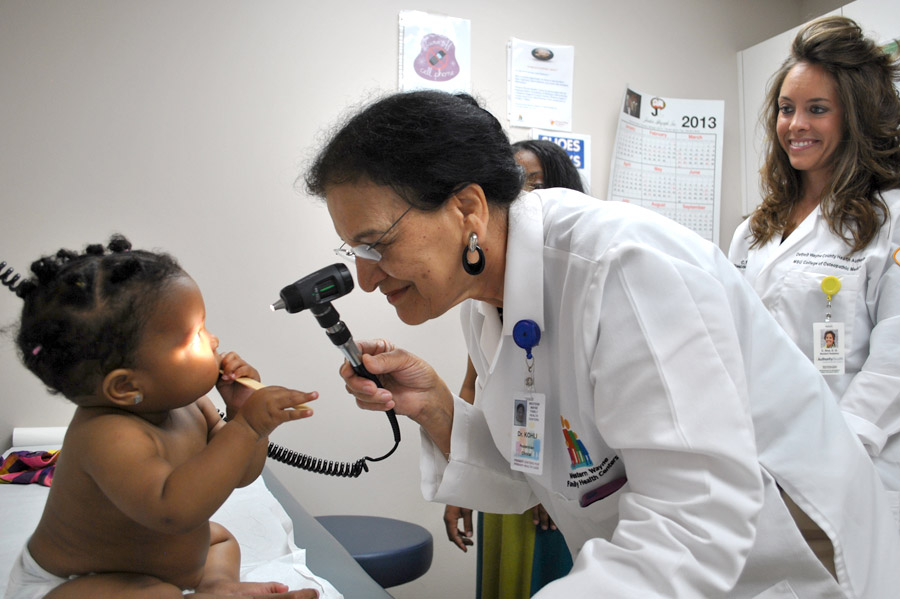
Representatives from various public and private health organizations are beginning work on an initiative to develop one or several health improvement plans for Detroit and Wayne County. The goal of the initiative is to identify and gain acceptance for strategies and to focus resources to measurably reduce negative health indicators, such as high levels of infant mortality, avoidable hospital re-admissions, and the negative effects of the social determinants of health.
“Despite the prevalence of high quality hospital and community health resources, and one of the nation’s largest medical schools, Detroit and Wayne County remains one of the sickest regions of the state. It’s clear that we need to do something differently, and that it will take more than one health system and more than one community health initiative to move us effectively in the right direction,” said Chris Allen, CEO of the Detroit Wayne County Health Authority. “The Health Authority is pleased to facilitate this process that will be inclusive of all providers. One of the important objectives of this initiative is bringing together public and private health decision-makers to focus and optimize deployment of community resources.”
David Goldbaum, MA, MSc, PMP, serving as Executive-In-Residence for Health Data Analytics at the Health Authority, will oversee the initiative, together with Sarah Lewis, Kellogg Population Health Fellow. The Detroit-Wayne County Health Improvement Plan initiative will have three main objectives:
- Develop a series of three practical, current status and dashboard reports on the health status of Detroit and Wayne County.
- Identify and develop collaborations with key community partners to produce a Detroit and Wayne County Community Health Needs Assessment that is consistently meaningful, and that can drive the understanding needed to achieve measurable health improvement results.
- Develop one, or multiple health improvement plans to address the highest health priorities as identified by the most motivated and capable Detroit and Wayne County stakeholders.
While the initiative is expected to result in a single series of analyses describing the current state of community health and health delivery resources, one or more Health Improvement Plans may emerge depending on the areas of focal interest among the initiative collaborators. The initiative, as currently designed, is expected to take about three years to complete, according to Goldbaum.
The project scope includes:
- Compile relevant, health data for Detroit and Wayne County at the zip codeand census block levels for alternative community definitions.
- Identify and develop meaningful health and health care statistics across measurable dimensions or benchmarks for health status.
- Apply existing best practices to “hot-spot” physical pockets of poor health so that programmatic interventions can apply scarce resources to the highest health management priorities. For example, to focus ambulatory care outreach programs in particular sub-communities so as to reduce avoidable hospital admissions, and ultimately, to reduce the cost/patient/month of delivering care with better outcomes.
- Develop shared templates; surveys; leverage newly emerging analytical technologies and develop tools to achieve cost economies of scale, focus programs and speed the path to measurable results.
- Identify disparities in health and/or health care services by geo-location and alternate definitions of “communities.”
- Integrate the IRS-990 form data submitted by most health systems, describing the levels and types of community-benefit financial investments that are made within their primary market catchment areas in Detroit and Wayne County.
- Provide practical guidelines and acceptable recommendations for the improvement of health status in Detroit and Wayne County.
“This initiative is especially timely considering the George Washington University community needs assessment project that is getting under way nationally, with Detroit one of the eight cities selected to participate,” Lewis explained. Health providers and community agencies will advise George Washington University on the efficacy of its new standardized needs assessment tool. “This information, along with analytics developed from hospital discharges, vital records and surveys, will contribute to the initiative painting a rich picture of local health status and resource distribution.”
This initiative is being led by the Health Authority, with community stakeholders from various organizations. For more information on this project, contact David Goldbaum at 313-871-3751.